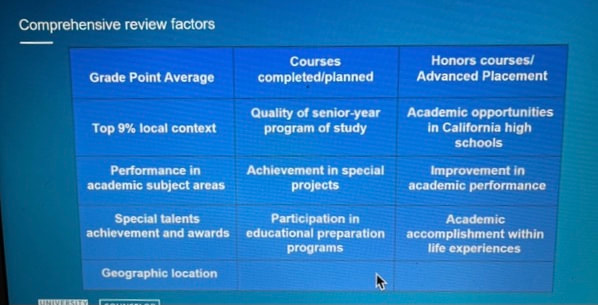|
11 Ways to Appeal for More Financial Aid or Merit Aid
An effective way to reduce the cost of college is to know how to successfully appeal for more financial aid. It’s critical to understand that the first financial aid award that a college delivers often doesn’t have to be the only offer. This is especially true since the enrollment management arms of many colleges use sophisticated algorithms in the hopes of answering this question: What is the smallest amount of a financial aid or merit award that we can offer a student that the family would accept. How to successfully appeal for more financial aidHere are 11 things you should consider when appealing an award: 1. You don’t have to have a good reason to appeal.Conventional wisdom suggests that you have to possess a solid financial reason to successfully appeal a college award. Those traditional reasons include: • Loss of a job or hours reduction which may or may not be caused by the pandemic. • Death of a parent. • Need to support family members such as elderly parents. • Change of marital status. • Expensive medical bills. Parents who face these financial challenges should definitely appeal a disappointing award, but many, many schools will entertain appeals without a solid financial reason. You also don’t have to have a good reason to ask for a better merit award! 2. Chances of a successful financial aid or merit award appeal will improve if the college needs more students. Chances of success with an appeal for more need-based or merit aid can depend on how the college is faring with its freshmen deposits. If the freshmen deposits are coming in too slow, a college can be much more willing to sweeten an offer. In fact, some schools will make up a new scholarship and tell accepted student that the admission office just “discovered” that the teenager was also eligible for an additional scholarship. A former president of a Midwestern University once told me that his college would routinely give an accepted student an extra $2,000 or $3,000 a year if it looked like this would seal the deal. He recalled one instance when the school gave a child an extra $2,000 a year when the parent said the teenager’s aunt was an alum. This behavior is especially true when applying to colleges and universities that must work harder to attract students. Schools in that category would include those that wish their U.S. News & World Report rankings were higher and their acceptance rate was lower. This describes most schools! See the following post of mine that discusses money implications for reach, target and safety schools. Reach, target and safety schools. Don’t slip when creating a smart college list 3. How desirable is the student?Whether a university will hike the amount of need-based financial aid or boost a merit scholarship can depend on how much the school wants a student. A college will be more likely to spurn an appeal if an accepted applicant was on the bubble in terms of admission. 4. Be careful when you negotiate.While negotiating for a better award, parents don’t want to antagonize the admission staffers by using the word negotiate. Parents also don’t want to come on strong. Remember, admission staffers have the power to dispense better awards. Treat them as gingerly as a police officer who is on the verge of writing you a ticket. 5. Appealing for merit aid won’t always work.Sometimes parents are surprised when their smart children get into elite schools, but don’t receive a merit award. As I’ve discussed previously in my blog and my course, The College Cost Lab, eite universities typically give little or no merit scholarships. They don’t have to since the parents of rich students are willing to pay full price for brand names. If your child got into an Ivy League school, for instance, there would be no point in appealing for a merit award because these institutions don’t provide them. 6. You can appeal after the deposit deadline.Schools don’t like to admit this, but some of them continue to market to students even after the official admission season is over. Parents might be able to obtain a better price from a school that is forced to continue recruiting students into the late spring and summer. Many colleges are recruiting into the summer which makes the traditional May 1 deposit deadline a quaint artifact. 7. Ask about how your home equity impacts your award.Most colleges don’t include home equity in their aid calculations, but the majority of institutions that use the CSS Profile do. Parents can appeal the school’s use of their home equity and at the very least ask the college to limit its impact. 8. Back up your appeal with details.Parents should be as detailed as possible when requesting greater awards. If a household has high medical bills, for instance, offer to show copies. If hours have been cut, provide a letter from the employer that backs up the statement. 9. Share competing offers.If a teenager has better offers from schools, show them to the college the child wants to attend. Ask in advance if this would matter and find out who to scan the offers to. I had a friend do this when her teenager’s No. 1 choice—California Lutheran University—made an offer that was lower than the other universities that included Linfield College, Dominican University and University of the Pacific. She shared the other awards with Cal Lutheran and the university matched the best award. 10. Be proactive.If the financial aid application won’t adequately represent your financial situation, you should speak up before receiving an award. Contact the school after your child has applied, but before you receive the award. Some advisors recommend withholding this information until a financial package is given, but I disagree. I think it’s better to present the extenuating circumstances upfront when there are more financial aid dollars in a college’s kitty. 11. Use TuitionFit.When looking at award letters, definitely check out TuitionFit. TuitionFit is an invaluable tool that has helped thousands of parents and teenagers decide whether individual awards are the best possible and, if desired, quickly recalibrate their college search for better financial fits. TuitionFit lets you see what kind of awards high school seniors are receiving this year from schools your child applied to and also what kind of awards students, with similar academic and financial backgrounds are getting. S
0 Comments
There has been a controversy enveloping Hamline University following the depiction of a work of art in an art class. Here is a part of a great article on the issue by Scott Jaschik January 17, 2023 "Hamline University has been engrossed in an academic freedom debate this year over the actions of an adjunct instructor at the private Minnesota institution who was teaching global art history. The instructor, Erika López Prater, was discussing Islamic art during one class and briefly exhibited a screen image of Muhammad, the founder and prophet of the Muslim faith. The instructor had warned students in advance of her plan to show the image. A Muslim student complained, and López Prater will not be teaching the course this semester. Hamline administrators said the decision not to renew her teaching contract this semester was warranted because of the tradition of Muslims avoiding viewing images of Muhammad and the belief held by some adherents that doing so is sacrilegious. But a wide coalition of academic and civil rights groups has defended López Prater, and López Prater argued that her nonrenewal violates traditions of academic freedom—and is particularly egregious given her advance warning to students that she intended to show the image. Her defenders have also noted that Muslims are not all in agreement about displaying images of Muhammad, particularly images like the one shown in class, which was from the 14th century, and those that are respectful of Muhammad." The article goes on at length, and is worth reading in its entirety. https://www.insidehighered.com/news/2023/01/17/hamline-reviews-policies-set-academic-freedom-dispute. This is an issue that requires open and constructive conversation. I'd be curious to know what others think about this, and how they feel the situation should have been addressed. The above is a slide from this year's UC conference showing the factors considered for admission to the UC system. As you can see, GPA and coursework are key. So how difficult a course load should a student take? I tell my students that they need to get eight hours of sleep a night, have time to have some fun, and not have knots in their stomaches. They should take the hardest classes they can and still maintain those perimeters. For some students, that will be no AP classes. Some will take one or two. Others can handle five APs and two honors classes in one semester. I find students have a fairly realistic idea of how much rigor they can handle as long as we give them the right to choose.
 There has already been at least one article declaring the college admission essay a thing of the past. According to a recent article in the New York Times, ChatGPT is the smartest, funniest, most humanlike chatbox to date. College counselors are wondering if we will become obsolete. Will AI will be writing essays for high school students on everything from how they have made their community a better place to why they wish to attend XXX University? College professors are wondering how they will grade papers that may have been written by AI. Journalists worry that all future news article will be generated by a machine. According to Gary Marcus, emeritus professor of psychology and neural science at NYU, in an interview on the Ezra Klein show,"It's synthesizing a bunch of stuff that humans have actually written already, sometimes for better and sometimes for worse...So everything it produces sounds plausible because it's all derived from things that humans have said...I worry ... any time you ask a machine to do something, if it doesn't really understand who you are, it can misinterpret that request." So it will be fascinating to see what happens with this new technology. I, for one, hope that students will continue to write their own essays. I see so much growth take place during the application process as students are forced to reflect deeply on who they are and what they want out of life. I would hate to take that away from them. |
Masland Educational Consulting
|




 RSS Feed
RSS Feed
